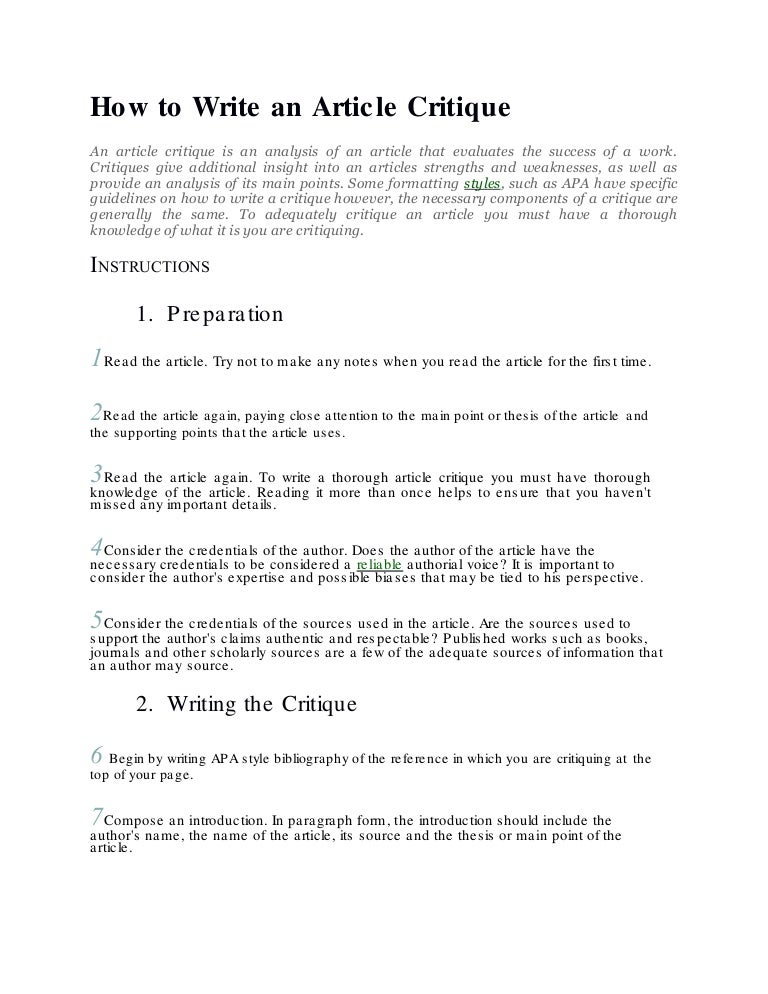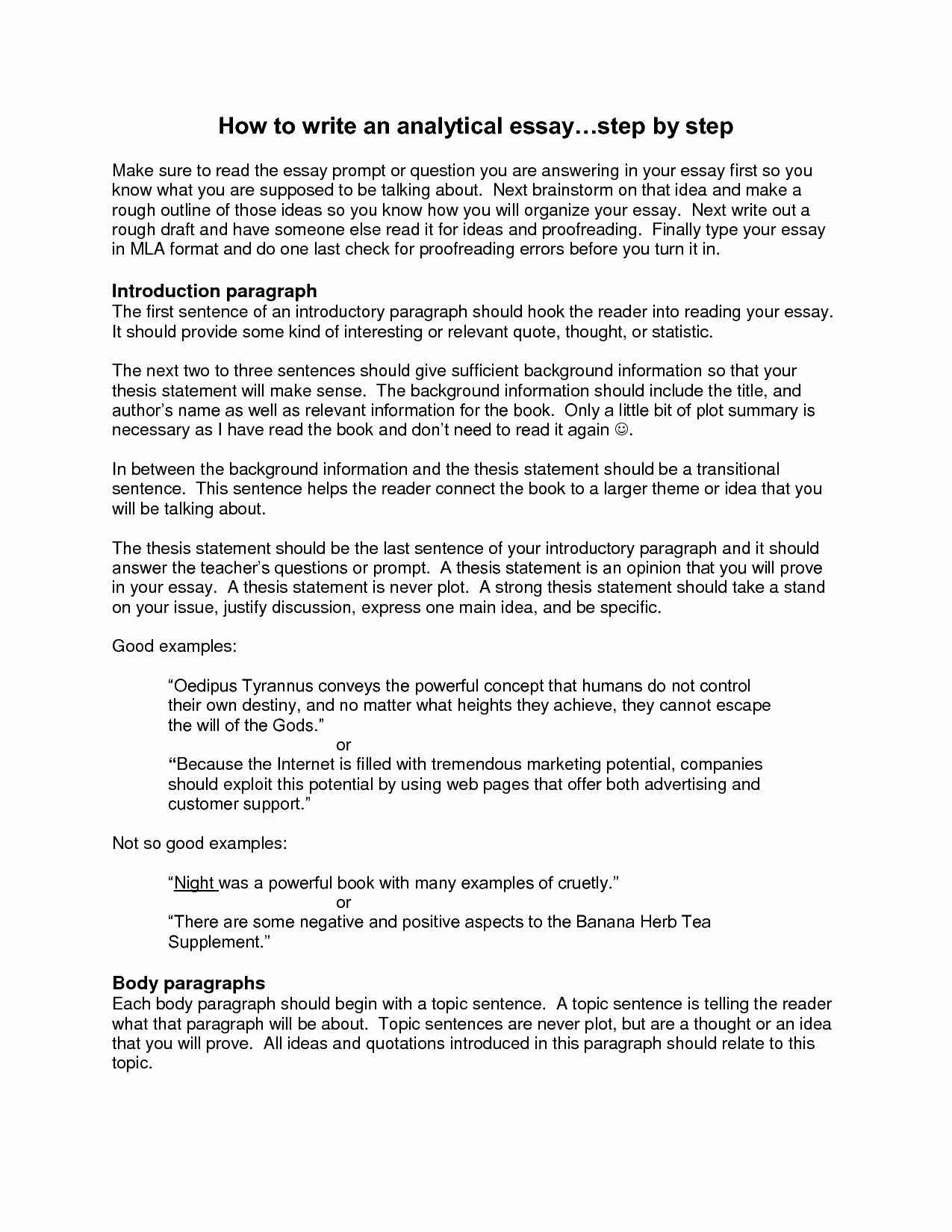
ARTICLE CRITIQUE 2 the authors, and the main point of the article. Article Critique. Graduate student enrollment has increased in recent years, but these students face many challenges on their path to a degree. Researchers have noted that graduate students experience anxiety and stress that may be connected to high attrition rates (Poock, File Size: KB · Critique papers summarize and judge the book, journal article, and artwork, among other sources. Basically, these papers include a critical evaluation of the item under reflection. In this case, learners must follow an academic writing style and include different sections, like the introduction, body, and conclusion A critique is a genre of academic writing that briefly summarises and critically evaluates a work or concept. Critiques can be used to carefully analyse a variety of works such as: Creative works – novels, exhibits, film, images, poetry. Research – monographs, journal articles, systematic reviews, theories. Media – news reports, feature articles. Like an essay, a critique uses a formal, academic writing style
QUT cite|write - Writing a critique
Last Updated: March 29, References Approved. To create this article, 39 people, some anonymous, worked to edit and improve it over time. There are 7 references cited in this article, which can be found at the bottom of the page. wikiHow marks an article as reader-approved once it receives enough positive feedback.
This article has been viewedtimes. Learn more A critique is usually written in response to a creative work, writing a critique paper, such as a novel, a film, poetry, or a painting. However, critiques are also sometimes assigned for research articles and media items, such as news articles or features. A critique is slightly different than a traditional 5-paragraph theme, as it is usually focused on the overall effectiveness and usefulness of the work it is critiquing, rather than making a strictly analytical argument about it.
Organizing your critique into 5 paragraphs can help you structure your thoughts. To write a 5-paragraph critique, provide the basic information about the work you're critiquing in the first paragraph, including the author, when it was published, writing a critique paper, and what its key themes are. Then, conclude this paragraph with a statement of your opinion of the work.
Next, identify 3 central positive or negative issues in the work and write a paragraph about each one. For example, you could focus on the color, light, and composition of a painting, writing a critique paper. In the final paragraph, state your overall assessment of the work, and give reasons to back it up. For tips on how to take notes on the piece your critiquing, writing a critique paper, read on! Did this summary help you? Yes No. Log in Social login does not work in incognito and private browsers.
Please log in with your username or email to continue. wikiHow Account. No account yet? Create an account. Community Dashboard Write an Article Request a New Article More Ideas Edit this Article. Courses Writing a critique paper Tech Help New Expert Videos About wikiHow Pro Upgrade Sign In. Home Random Browse Articles Courses New About wikiHow Easy Ways to Help Approve Questions Fix Spelling Quiz App More Things to Try We use cookies to make wikiHow great. By using our site, you agree to our cookie policy.
Cookie Settings. wikiHow is where trusted research and expert knowledge come together. Learn why people trust wikiHow. Categories Education and Communications Studying Subjects English English Grammar Writing Paragraphs How to Write a Critique in Five Paragraphs. Download Article Explore this Article parts. Sample Critiques. Tips and Warnings. Related Articles. Article Summary. Author Info Last Updated: March 29, References Approved. Part 1 of Examine the prompt or assignment. Be sure you understand exactly what you are being asked to do.
Read the text. Keep in mind some questions and take notes as you read. These will help guide your formulation of your ideas later. If not, why do you think that is? This can be crucial to determining the success of a work; for example, a movie intended for young children might work well for its intended audience but not for adult viewers.
What reactions do you have when reading or viewing this work? Does it provoke emotional responses? Do you feel confused? What questions does the work make you think of? Does it suggest other avenues of exploration or observation to you?
Do some research. You usually will not need to do a lot of research, but in order to talk about how the work relates to a larger issue or context, you will need to know what it is responding to, what context it was created in, etc.
As another example, if you're writing about a movie, you might want to briefly discuss the director's other films, writing a critique paper, or other important movies in this particular genre indie, action, drama, etc. Your school or university library is usually a good place to start when conducting research, as their databases provide verified, expert sources. Google Scholar can also be a good source for research. Part 2 of Give the basic information about the work, writing a critique paper.
The first paragraph is your introduction to the work, and you should give the basic information about it in this paragraph, writing a critique paper. For a film, you may wish to refer to a source such as IMDb to get the information you need. If you're critiquing a famous artwork, an encyclopedia of art would be a good place to find information on the creator, the title, and important dates date of creation, date of exhibition, etc, writing a critique paper.
Provide a context for the work. Just give your reader enough information to be able to understand the rest of your critique, writing a critique paper. If you are assessing a novel, it could be good to talk about what genre or literary tradition the novel is written within e.
and of the issue it is dealing with e. This element should consider what the thesis or purpose of the work is. Sometimes, this may be clearly stated, such as in a research article.
The authors of research articles will often state very clearly in the abstract and in the introduction to their work what they are investigating, often with sentences that say something like this: "In this article we provide a new framework for analyzing X and argue that it is superior to previous methods because of reason A and reason B.
For example, if you were examining the movie The Shining, you might argue that the filmmaker Stanley Kubrick's goal is to call attention to the poor treatment of Native Americans because of the strong Native American themes present in the movie.
You could then present the reasons why you think that in the rest of the essay. Summarize the main points of the work. Describe, briefly, how the main points are made. For example, you might talk about a work's use of characters or symbolism to depict its point about society, or you could talk about the research questions and hypotheses in a journal article. For example, if you were writing about The Shining, you could summarize the main points this way: "Stanley Kubrick uses strong symbolism, such as the placement of the movie's hotel on an Indian burial ground, the naming of the hotel "Overlook," and the constant presence of Native American artwork and representation, to call viewers' attention to America's treatment of Native Americans in history.
Present your initial assessment. Is your evaluation writing a critique paper to writing a critique paper principally positive, negative, or mixed? You may also wish to critique the research methodology, writing a critique paper, if there are obvious flaws present.
For creative works, consider what you believe the author or creator's goal was in making the work, and then present your assessment of whether or not they achieved that goal. Part 3 of Organize your critical evaluations. These should form the bulk of your critique and should be a minimum of three writing a critique paper. You can choose to organize your critique differently depending on how you want to approach your critique.
However, you should devote a paragraph to each main topic, using the rest of the steps in this writing a critique paper to develop each paragraph's discussion. If you have writing a critique paper than three points about your work, you can organize each paragraph thematically.
Discuss the writing a critique paper or styles used in the work, writing a critique paper. This is particularly important when evaluating creative works, such as literature, art, and music.
For example, if you are critiquing a song, writing a critique paper could consider how the beat or tone of the music supports or detracts from the lyrics. For a research article or a media item, you may want to consider questions such as how the data was gathered in an experiment, or what method a journalist used to discover information. Explain what types of evidence or argument are used.
This may be more useful in a critique of a media item or research article. Consider how the author of the work uses other sources, their own evidence, and logic in their arguments. Secondary sources? Quantitative data? Qualitative data? Are these sources appropriate for the argument? Has evidence been presented fairly, without distortion or selectivity? Does the argument proceed logically from the evidence used? Determine what the work adds to the understanding of its topic.
How to Write the Academic Critique Assignment--Critique of Academic Journal Article
, time: 16:49Writing a Critique — Hunter College

Begin Writing Your Own Critique of the Paper. Introduction. Begin your paper by describing the journal article and authors you are critiquing. Provide the main hypothesis (or thesis) of the paper. Thesis Statement. Article Summary. Your Analysis. Conclusion · Critique papers summarize and judge the book, journal article, and artwork, among other sources. Basically, these papers include a critical evaluation of the item under reflection. In this case, learners must follow an academic writing style and include different sections, like the introduction, body, and conclusion ARTICLE CRITIQUE 2 the authors, and the main point of the article. Article Critique. Graduate student enrollment has increased in recent years, but these students face many challenges on their path to a degree. Researchers have noted that graduate students experience anxiety and stress that may be connected to high attrition rates (Poock, File Size: KB
No comments:
Post a Comment